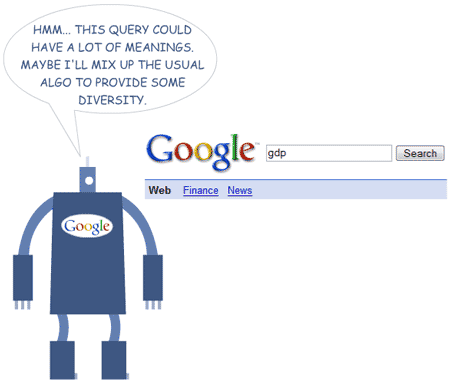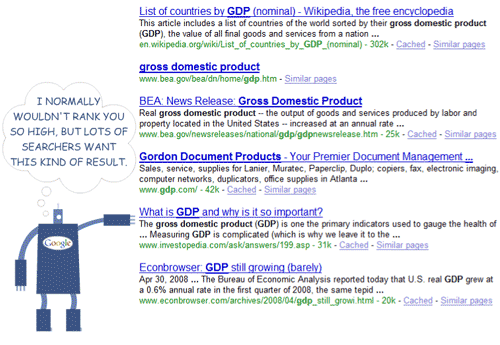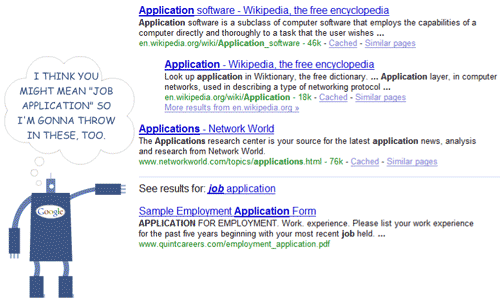
Does "Query Deserves Diversity" Algorithm Exist at Google?
Most of us in the search space are familiar with the principles of the "query deserves freshness" (QDF) algorithm at Google, but this is almost certainly not the only intent detection process and algo-tweaking area the engine applies. One popular theory that gets inspires a good bit of discussion around the SEO water cooler is that Google may recognize queries with the potential for multiple intents and attempt to modify the search results to include more than just those pages that would normally rank (based on their standard algorithm).
This weighting system for more ambiguous or multi-intent queries can't be proven, but it doesn't seem unlikely to me. Let me walk through a quick example to help illustrate the concept. Let's say you're performing a search for "GDP."

Why, Googlebot, what a fascinating idea. What kind of results might this produce?

So - because a lot of searchers express a preference for more diverse results than just those pages that ordinarily would "make the cut," Google provides an extra helping hand to pages they feel help to satisfy those searchers. This data could be gleaned from lower CTRs in the SERPs, greater numbers of query refinements, and even a high percentage of related searches performed subsequently.
Of course, when Google wants to get really serious about disambiguation, they go a different route. Check out these SERPs for the term "application:"

These "horizontal line," disambiguation style results appear on many searches where Google thinks that the searcher is probably seeking something that their query isn't producing. They're especially likely to appear for very general search phrases.
My personal experience has been that a more subtle, "Query Deserves Diversity" (QDD) algorithm does exist, at least to some degree. It makes a lot of logical and searcher satisfaction sense in results like:
p.s. Just out of curioosity, does anyone know why, on that first search result I showed for "GDP," the second result from BEA.gov isn't indented?
This weighting system for more ambiguous or multi-intent queries can't be proven, but it doesn't seem unlikely to me. Let me walk through a quick example to help illustrate the concept. Let's say you're performing a search for "GDP."

Why, Googlebot, what a fascinating idea. What kind of results might this produce?

So - because a lot of searchers express a preference for more diverse results than just those pages that ordinarily would "make the cut," Google provides an extra helping hand to pages they feel help to satisfy those searchers. This data could be gleaned from lower CTRs in the SERPs, greater numbers of query refinements, and even a high percentage of related searches performed subsequently.
Of course, when Google wants to get really serious about disambiguation, they go a different route. Check out these SERPs for the term "application:"

These "horizontal line," disambiguation style results appear on many searches where Google thinks that the searcher is probably seeking something that their query isn't producing. They're especially likely to appear for very general search phrases.
My personal experience has been that a more subtle, "Query Deserves Diversity" (QDD) algorithm does exist, at least to some degree. It makes a lot of logical and searcher satisfaction sense in results like:
- Company names (where folks might want to get positive and negative press, as well as official company domains)
- Product searches (where e-commerce style results might ordinarily fill up the SERPs, but Google tries to provide some reviews and non-commercial, relevant content)
- News & political searches (where it might be prudent to display "all sides" of an issue, rather than just the left/right-wing blogs that did the best job baiting links)
p.s. Just out of curioosity, does anyone know why, on that first search result I showed for "GDP," the second result from BEA.gov isn't indented?
The author's views are entirely their own (excluding the unlikely event of hypnosis) and may not always reflect the views of Moz.




Comments
Please keep your comments TAGFEE by following the community etiquette
Comments are closed. Got a burning question? Head to our Q&A section to start a new conversation.